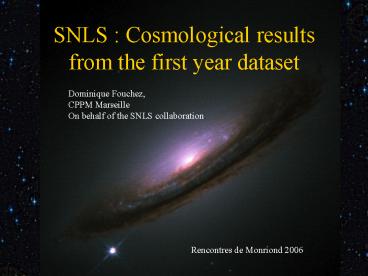SNLS : Cosmological results from the first year dataset - PowerPoint PPT Presentation
Title:
SNLS : Cosmological results from the first year dataset
Description:
Scanning-free-automatized detection pipeline has been set up (shapelet-neural ... 250H/year of photo. Rencontre de Monriond 2006 SNLS 1st year cosmological results ... – PowerPoint PPT presentation
Number of Views:22
Avg rating:3.0/5.0
Title: SNLS : Cosmological results from the first year dataset
1
SNLS Cosmological results from the first year
dataset
Dominique Fouchez, CPPM Marseille On behalf of
the SNLS collaboration.
Rencontres de Monriond 2006
2
Plan of the talk
- Deep homogenous and complete SNIa observation
- Detection
- Photometry deep and well sample SN lightcurves
- Spectrocopy -gt identification of each SN
- Precise Measurement
- Differential photometry
- Calibration
- Hubble diagram and cosmology
- Lightcurve modelling , fitting and luminosity
distance - Hubble diagram and cosmological parameter fitting
- Full cosmological parameter error estimation
3
- Deep homogenous and complete SNIa observations
- Detection
- Photometry
- Spectroscopy
4
Photometry
- CFHT 3.6 meters at Hawaii
- Megacam imager of 1 sq degree
- Observation of the 4 CFHTLS/DEEP 1d2 fields in 4
colors
5
Detection
- Principle of detection same field observed
every 4 days - Subtraction of each night (stacked images) on a
reference image to find individual detections
then construction of Lightcurve of candidates
-
days
6
Photometry deep and well sampled lightcurves
- Rolling search method same field every 4 days
automatic follow up (and down!)
7
Real Time Detection
- Need a spectroscopy a maximum of luminosity
quasi-real time detection - 2 pipelines detect new candidatess in 24h hours
time after observation - Scanning-free-automatized detection pipeline has
been set up (shapelet-neural net based detection)
8
Spectroscopy
- Spectrocopy 8m - class
- VLT FORS1
- Gemini GMOS
- Others KECK LRIS
250H/year of spectro 250H/year of photo
9
The SNIa sample Status
- March 2006 2.5 years of
running - 440 spectra analysed in quasi real time
- 231 Ia identified with spectroscopy, ready for
cosmology
10
Digression
- In addition to SNIa sample, many variable
objects, which include many SN non IA . - This big sample make it possible to study other
science topics than cosmological parameters
within the SNLS photometricspectroscopic data - They are numerous
11
Other SNLS topics
Type Ia rates Metallicity effects Type Ia progenitors Redshift evolution Cosmology with Type II SNe
SN Ia UV properties Properties of Dust Type Ia rise times Epoch of cosmic deceleration Ia explosion mechanism
Ia Intrinsic Scatter Benetti velocity diagram High-stretch SNe Ia diversity Core collapse SN rate CMAGIC
Core collapse progenitors Improved K-corrections SN Ib/c-GRB connection SN Ia peak-tail ratio Ia metallicity cutoff
Ia geometric effects II-P risetime IR Hubble Diagram Type IIn - Type Ia connection AGN/SN Ia connection
Ia pseudo-EW correlations Host galaxy properties Unique SNe Ia high velocity components SN color-color selection
SN Luminosity distribution Cosmic star formation history Deflagration vs. detonation Intrinsic Type Ia colors Type II shock breakout
Stretch, MLCS, ?m15 improvements Galactic chemical evolution Are SNe Ia a one parameter family? Are there low-s SNe Ia at high z? Groundwork for future (JDEM, LSST)
12
Precise Measurement of SNIa sample
- Differential photometry
- Calibration
- Only the first year of data has been released and
will be presented in the rest of the talk - 91 Sne Ia 10 miss references
- 6 only have 1 band
73 usable SNIa events - 2 peculiars
13
Differential photometry Method
Input images variable seeing kernel (wrt
best) -gt Fit galaxy on a stamp Fit position (same
in all images) Fit flux on each exposure
14
Differential Photometry Results
- Photometry close to optimal (only 15 worse than
photon statistics) - Lightcurve points flux with errors (full
covariance matrix)
15
Photometric calibration
- Same Differential photometry is used to measure
tertiary standard stars in each field - Calibration on observed Landolt stars
- 1 zero point dispersion (except z)
16
- Hubble diagram and cosmology
- Lightcurve modelling , fitting and luminosity
distance - Hubble diagram and cosmological parameter fitting
- Full cosmological parameter error estimation
17
Lightcurve fitting with SALT method
- 2 parameters describe the variability of SNIa
lightcurves, but the luminosity at max s and c
(stretch and color)
18
Distance measurement
- The fitted s and c are used to correct for the
brighter-slower and brighter-bluer behaviour - The correction coefficients a,b and M have been
fitted together with the cosmology on the whole
lightcurve samples. - The distance is then derived from magnitude at
max in B restframe and s,c
19
Hubble diagram
- 44 low z 71 SNLS Supernovae
20
Hubble diagram Coming soon ...
21
Cosmological parameter fits
BAO Baryonic Acoustic Oscillation Eisentein 2005
22
Systematic uncertainties
- Possible sources
- Calibration and photometry
- Evolution
- Malmquist bias
- Contamination
- Gray dust
- Lensing
23
Calibration
- 1 on zero points
24
Evolution Comparison Low/High Z
Stretch
color
- ?
No sizeable evolution !
25
Malmquist bias
- ?
Selection effect (keep brightest at high z)
found on the data at same level as what expected
from montecarlo Max of 0.05 deviation at z1
26
Summary of systematic uncertainties
27
Final result
Statistical error is still dominant
28
Perspectives
- With full the statistics 700 SNIa expected (x10
!), the measurement will start to be systematics
limited - Improvement on main systematics errors is under
study - Calibration z zero point ,in particular, can be
improved but need other calibrators than Landolt
-gt join calibration campaign with CFHT to
calibrate with spectrophoto standards the DEEP
fields. - Detailled study of selection effects with huge
Montecarlo dataset is underway. - Lightcurve modelling improvements.































